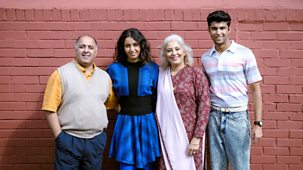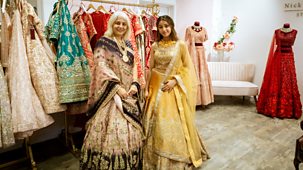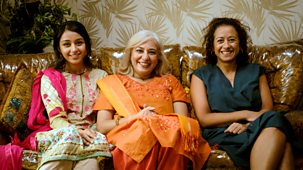
Series 1: Episode 3
The Sharma family embark on the third stage of their time-travelling adventure through British Asian history, guided by BBC Asian Network’s Noreen Khan and historian Yasmin Khan. This time it’s the 80s and 90s, decades in which the hard work of South Asian families was beginning to pay off, with success reflected in everything from the huge stereo and mahogany display cabinet housing the best glass and china to the embossed gold wallpaper in their living room.\n\nThe family get to work quickly in their business, stocking the shop’s new alcohol section. The shop has broadened out from serving a predominantly South Asian clientele to a mini-mart serving everyone. Gone are piles of chickpeas, sacks of rice and jars of turmeric sold by the gram – replaced by a freezer packed with ready meals, shelves stacked with tinned and packaged goods, and a deli counter selling spam by the slice to their new customers.\n\n1982 sees the shop stocking their first VHS tapes for rental. Noreen brings artist Dawinder Bansal, who grew up above her dad’s electrical and video shop, to visit and teach Alisha and Akash tricks of the trade. While mum Manisha shoves frozen pizzas and chips from the shop into the oven, she reminisces to Alisha how she and her sister were introduced to these foods by the good old British school dinner. But just as South Asian families were starting to embrace a more western diet, the BBC was helping prompt a culinary revolution in the other direction. The family watch Madhur Jaffrey’s primetime series Indian Cookery, in which she introduced a white British audience to mysterious ingredients like ginger and garam masala.\n\nEvents 4,000 miles away in India remind the Sharmas just how connected they are to their country of origin. The events surrounding the assassination of Indian PM Indira Ghandi divided Indians on religious grounds, with sectarian violence between Hindus and Sikhs spilling onto the streets of Britain. Yasmin brings Parm Sandu, an ex-senior police officer who lived through these troubling times in Birmingham, to spell out what this meant for Hindus and Sikhs living in the city in 1984.\n\nJust as the Sharmas are starting to feel as British as everyone else, Birmingham’s high unemployment and economic deprivation sees groups like the National Front scapegoat people of colour. As Asian shopkeepers, the Sharmas find themselves in the firing line.\nEastEnders actor Nitin Ganatra, who grew up in a family of shopkeepers, visits the family to share his personal experiences of violence like this.\n\nBy 1989, South Asians were beginning to be recognised across the board, featuring in the Sunday Times Rich List for business, playing the leads in soaps and creating the coolest youth show on the telly with Network East. Against this backdrop, an innovative cultural phenomenon emerged in Birmingham: the daytimer. With parents unwilling to let their teenagers go out at night, teenage South Asians would go clubbing during the day. Alisha and Akash get some time away from the shop to experience what was a rite of passage for many South Asian teenagers with legendary music producer Bally Sagoo.\n\nThe 90s brought more changes. Channel 4 began to screen the ancient sport of kabaddi on Sunday mornings. Played for over 600 years in India, Pakistan and Bangladesh, it gave British viewers a glimpse into this national sport. The Sharmas try their hand at this physically demanding game under the watchful eye of referee Ashok Das, who set up the first English kabaddi team in Birmingham and also played for the Indian national one.\n\nIn 1995, the family discover how one new dish put a small corner of Balsall Heath firmly on the map, in the form of the balti triangle. Crammed with 46 balti houses, the mid-90s was the triangle’s heyday as the city’s growing student population flocked to take advantage of the rock bottom prices. Alisha and Akash meet Zaf, chef at one of the oldest established restaurants, Shabbab’s, to find out the balti origin story and why it is now an iconic part of Brummie history.\n\nIn 1996, the internet was in its infancy, with only 30,000 websites online. Alisha, Manisha and aunt Jasmine explore the matrimonial site Shaadi.com, which would transform the way South Asians found their partners over the next decade. It’s a far cry from Tinder, but it offered a very modern version of matchmaking compared to the hand-captioned photos Alisha was presented with back in the 1950s.\n\nBy the end of the 90s, South Asian culture was mainstream. Cornershop scored a number one with their single about a Bollywood icon, Goodness Gracious Me was must-watch TV, and the economic upturn brought with it new opportunities in Birmingham. Things were certainly looking better.\n\nAs the decade and time-travelling experiment draw to a close, the Sharmas host their last end-of-era party in Sparkbrook and reflect on what this journey has taught them about the South Asian experience and how the city of Birmingham shaped that experience.
Source: BBC 2
Most recent episodes of Back in Time for Birmingham
Back In Time For Birmingham
Series 1: Episode 4
Guided by BBC Asian Network’s Noreen Khan and historian Yasmin Khan, the Sharma family reflect on their time-travelling journey through British Asian history and discover ...
10-03-2023
BBC 2
Back In Time For Birmingham
Series 1: Episode 3
The Sharma family embark on the third stage of their time-travelling adventure through British Asian history, guided by BBC Asian Network’s Noreen Khan and historian Yasmi ...
09-03-2023
BBC 2
Back In Time For Birmingham
Series 1: Episode 2
The Sharmas continue their journey through British Asian history, guided by BBC Asian Network’s Noreen Khan and historian Yasmin Khan. By the 1970s, many South Asian famil ...
08-03-2023
BBC 2
Back In Time For Birmingham
Series 1: Episode 1
This series sees the Sharma family go back in time to discover what life was like for families who came from South Asia to settle in Britain from the 1950s onwards. The city of ...
07-03-2023
BBC 2
Most popular episodes of Back in Time for Birmingham
Back In Time For Birmingham
Series 1: Episode 1
This series sees the Sharma family go back in time to discover what life was like for families who came from South Asia to settle in Britain from the 1950s onwards. The city of ...
07-03-2023
BBC 2
Back In Time For Birmingham
Series 1: Episode 2
The Sharmas continue their journey through British Asian history, guided by BBC Asian Network’s Noreen Khan and historian Yasmin Khan. By the 1970s, many South Asian famil ...
08-03-2023
BBC 2
Back In Time For Birmingham
Series 1: Episode 3
The Sharma family embark on the third stage of their time-travelling adventure through British Asian history, guided by BBC Asian Network’s Noreen Khan and historian Yasmi ...
09-03-2023
BBC 2
Back In Time For Birmingham
Series 1: Episode 4
Guided by BBC Asian Network’s Noreen Khan and historian Yasmin Khan, the Sharma family reflect on their time-travelling journey through British Asian history and discover ...
10-03-2023
BBC 2




